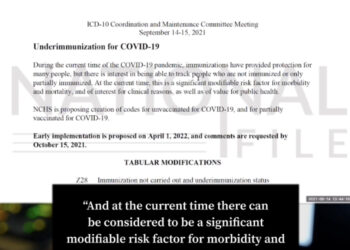Republican legislators in North Dakota are taking a pro-active – and constitutional – step to push back against unconstitutional executive orders coming out of the Biden administration, and they are doing so with the power of the US Constitution in their corner.
A new bill introduced in the North Dakota State Legislature (HB1164), would instruct the state’s Attorney General to review the constitutionality of each of the executive orders issued by Joe Biden.
Under the proposed law, should the North Dakota Attorney General find that any executive orders are unlawful – or unconstitutional, the executive order would be “nullified,” it would prohibit any state, county, or local agency – or publicly funded organization – from enforcing the order(s).
This is the way. @TenthAmendmenthttps://t.co/PekQfWpHXQ
— Libertarian Party of Connecticut (@LPofCT) January 29, 2021
The proposed legislation was introduced by State Rep. Tom Kading (R), and eight other Republicans in the North Dakota House.
Specifically, the proposed HB1164, enumerates the following issues for nullification:
- Pandemics or other health emergencies
- The regulation of natural resources, including coal and oil
- The regulation of the agriculture industry
- The use of land
- The regulation of the financial sector as it relates to environmental, social, or governance standards
- The regulation of the constitutional right to keep and bear arms
Additionally, State Rep. Sebastian Ertelt (R), has introduced legislation that would affect the same fate to unconstitutional legislation coming out of the Federal Legislative Branch.
Ertelt’s HB1282 would create a “Committee on Neutralization of Federal Laws.”
This committee, comprised of state legislative leadership and their appointees, would recommend whether a given Federal law or regulation is unconstitutional. Should the committee find that a law or regulation is unconstitutional, the North Dakota Legislature would pass a concurrent resolution on whether to nullify the transgressing law or edict.
After the committee’s recommendation – and until the resolution is passed, state, county, and local agencies would be prohibited from enforcing the law or regulation.
These proposed laws are in a good position to be codified. North Dakota Republicans control the Senate 40 to 7, and the House 80 to14.
https://twitter.com/SamSullivan/status/1356356339484794880
South Dakota has legislation similar North Dakota’s HB1164 targeting Biden’s executive lawmaking.
South Dakota’s HB1194 sets up an executive board to review the constitutionality of all presidential executive orders. It lists the six issues laid out in the North Dakota legislation as well.
The South Dakota Legislature – as with the North Dakota Legislature – is dominated by Republicans; 32 to 3 in the Senate, and 62 to 8 in the House.
The United States Constitution’s Supremacy Clause enjoins each state to follow laws that are constitutionally sound and only on issues that the Constitution granted purview to the federal government to determine.
If the federal government – be it the Executive, Legislative, or the Judicial Branch – acts unconstitutionally, the individual states have a right to ignore the transgressing edict. This notion was championed by none other than the great champion of strong central government, Alexander Hamilton, in Federalist No. 33.





















